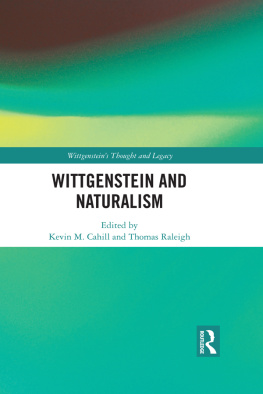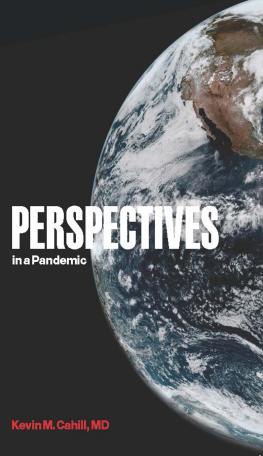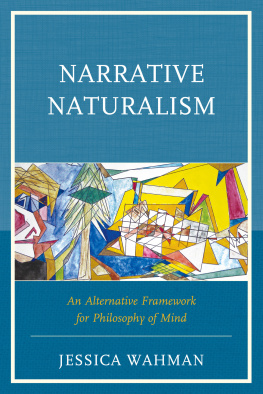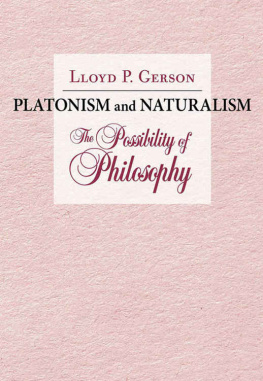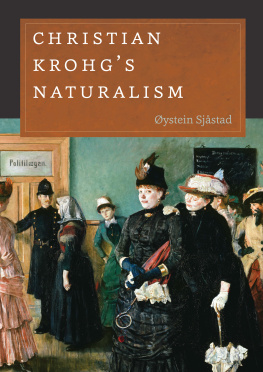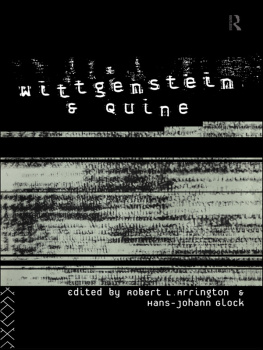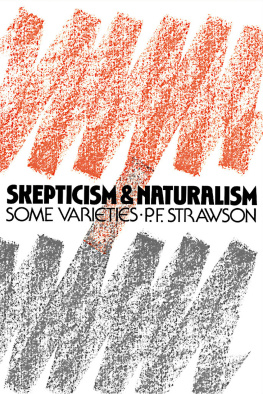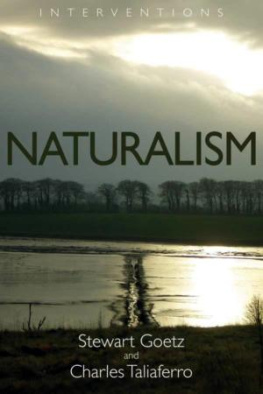Several of the essays in this volume were first presented at the conference Wittgenstein, Philosophy of Mind, and Naturalism held at the University of Bergen on June 1213, 2015. The editors were co-organizers of this conference, and they would like to thank the Universitetsfond at the University of Bergen as well as the Representationalism or Anti-Representationalism? project at the Norwegian University of Science and Technology for the generous support that made this event possible. In addition, we would like to express our gratitude to Andrew Weckenmann and to co-editor Alexandra Simmons from Routledge for their help and patience throughout the process of putting this volume together. Thanks are also due to series co-editor Eugen Fischer for much guidance along the way. Finally, we would like to thank our contributors, whose hard work and philosophical acumen made this volume possible.
First published 2018
by Routledge
711 Third Avenue, New York, NY 10017
and by Routledge
2 Park Square, Milton Park, Abingdon, Oxon OX14 4RN
Routledge is an imprint of the Taylor & Francis Group, an informa business
2018 Taylor & Francis
The right of the editors to be identified as the authors of the editorial material, and of the authors for their individual chapters, has been asserted in accordance with sections 77 and 78 of the Copyright, Designs and Patents Act 1988.
All rights reserved. No part of this book may be reprinted or reproduced or utilised in any form or by any electronic, mechanical, or other means, now known or hereafter invented, including photocopying and recording, or in any information storage or retrieval system, without permission in writing from the publishers.
Trademark notice: Product or corporate names may be trademarks or registered trademarks, and are used only for identification and explanation without intent to infringe.
Library of Congress Cataloging-in-Publication Data
A catalog record for this book has been requested
ISBN: 978-1-138-23686-8 (hbk)
ISBN: 978-1-315-30159-4 (ebk)
Typeset in Sabon
by Apex CoVantage, LLC

| BB | The Blue and the Brown Books . New York: Harper Torchbooks, 1958. |
| BT | The Big Typescript TS 213 . Translated by C. Grant Luckhardt and Maximilian A. E. Aue. Oxford: Blackwell, 2005. |
| CV | Culture and Value (rev. 2nd ed.). Edited by G.H. von Wright. Translated by Peter Winch. Oxford: Blackwell, 1998. |
| LWVC | Ludwig Wittgenstein and the Vienna Circle. Edited by Brian McGuinness. Translated by Joachim Schulte and Brian McGuinness. Oxford: Blackwell, 1979. |
| OC | On Certainty . Translated by Denis Paul and G. E. M. Anscombe. New York: Oxford: Blackwell, 1969 |
| PG | Philosophical Grammar . Edited by R. Rhees. Translated by nthony Kenny. Oxford: Basil Blackwell, 1974 |
| PI | Philosophical Investigations . (See individual contributions for relevant edition) |
| RFM | Remarks on the Foundations of Mathematics . Edited by G. H. von Wright, R. Rhees, G. E. M. Anscombe. Revised editon. Oxford: Blackwell, 1978. |
| RPP I | Remarks on the Philosophy of Psychology . Edited by G. E. M. Anscombe and G. H. von Wright. Translated by G. E. M. Anscombe. Oxford: Basil Blackwell, 1980. |
| RPP II | Remarks on the Philosophy of Psychology . Edited by G. H. von Wright and Heikki Nyman. Translated by C. G. Luckhardt and M. A. E. Aue. Oxford: Basil Blackwell, 1980. |
| TLP | Tractatus Logico-Philosophicus . (See individual contributions for relevant edition.) |
| WLC II | Wittgensteins Lectures Cambridge 193235. Edited by Alice Ambrose. Chicago: University of Chicago Press, 1982. |
Dorit Bar-On is a Professor of Philosophy at the University of Connecticut. She has published extensively in the philosophy of mind and language, as well as epistemology and metaethics. In her book Speaking My Mind: Expression and Self-Knowledge (Oxford, Clarendon Press 2004), she developed a neo-expressivist framework for understanding first-person authority, later applied to ethical and other evaluative discourses. In recent years, she has become interested in continuities and discontinuities between animal expressive communication and language. She is currently working on a book manuscript tentatively titled Expression, Communication, and the Origins of Meaning . She is the director of an eponymous interdisciplinary research group at the University of Connecticut.
Sorin Bangu is a Professor of Philosophy at the University of Bergen, Norway. He has previously held positions at the University of Cambridge and the University of Illinois at Urbana-Champaign. He is the author of The Applicability of Mathematics in Science: Indispensability and Ontology (Palgrave Macmillan, 2012) and the editor of Naturalizing Logico-Mathematical Knowledge: Approaches from Philosophy, Psychology and Cognitive Science (Routledge, 2017). He has published widely in Philosophy of Science and Philosophy of Mathematics, with a particular interest in the work of Wittgenstein and Quine.
Stina Bckstrm is a Senior Lecturer at Sdertrn University and a researcher at bo Akademi University. She received her PhD in philosophy from the University of Chicago in 2013. She works on issues in the philosophy of mind and action, inspired by figures such as Anscombe, Wittgenstein, Cavell, and McDowell. Her dissertation, The Minds Movement: An Essay on Expression, treats acts of expression and intentional action. Since then she has written papers on, for example, what it is to depsychologize psychology, Ryles conception of skilled action, knowing other minds, and expression and self-consciousness.
Kevin Cahill is a Professor of Philosophy at the University of Bergen. He works mainly on Wittgensteins Philosophy and the Philosophy of the Social Sciences. His publications include The Fate of Wonder: Wittgensteins Critique of Metaphysics and Modernity (Columbia, 2011).
William Child is a Professor of Philosophy at the University of Oxford and a Fellow in Philosophy at University College, Oxford. He is the author of Causality, Interpretation, and the Mind (Oxford University Press, 1994) and Wittgenstein (Routledge, 2011), and co-editor, with David Charles, of Wittgensteinian Themes: Essays in Honour of David Pears (Oxford University Press, 2001). He has published widely on Wittgenstein and on issues in the Philosophy of Mind.
Annalisa Coliva is a Professor of Philosophy at the University of California, Irvine. She is the author of ten books, in both English and Italian, including The Varieties of Self-Knowledge. London (Palgrave, 2016), Extended Rationality. A Hinge Epistemology (Palgrave, 2015) and Moore and Wittgenstein. Scepticism, Certainty and Common Sense (Palgrave, 2010). She has published numerous articles in Epistemology and Philosophy of the Mind, with a particular focus on the work of Moore and Wittgenstein.
Eugen Fischer (BPhil, DPhil, Oxford; Habilitation , LMU Munich) is a Reader in Philosophy at the University of East Anglia. He has been a Heisenberg Research Reader (DFG), Golestan Fellow at the Netherlands Institute for Advanced Study (NIAS), and Senior Research Fellow at Collegium Budapest. He currently is perhaps the only Wittgenstein scholar who is also an experimental philosopher. His main interests are in the philosophy of philosophy and the philosophy of perception. His main projects are the exploration of therapeutic conceptions of philosophy and the study of how automatic cognition (intuition) shapes philosophical thought. He has examined automatic stereotypical inferences and analogical reasoning with metaphors (philosophical pictures), in the development of philosophical problems, arguments, and theories. His empirical work on stereotypical inferences (with psychologist P.E. Engelhardt) has pioneered the use of psycholinguistic methods in experimental philosophy. He is the author of Linguistic Creativity: Exercises in Philosophical Therapy (Springer 2000) and Philosophical Delusion and its Therapy (Routledge 2011, p/b 2013). He has co-edited (with Erich Ammereller) Wittgenstein at Work: Method in the Philosophical Investigations (Routledge 2004) and (with John Collins) Experimental Philosophy, Rationalism, and Naturalism: Rethinking Philosophical Method (Routledge 2015).

